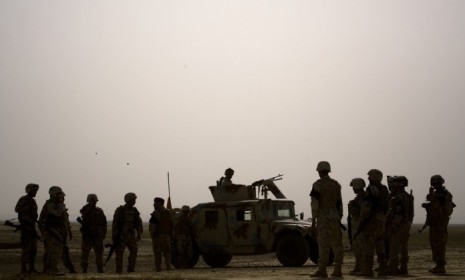The last combat troops leave Iraq: What it means
We still have tens of thousands of soldiers sticking around to train and advise Iraqi security forces. How significant is the official end of combat operations?

A free daily email with the biggest news stories of the day – and the best features from TheWeek.com
You are now subscribed
Your newsletter sign-up was successful
Nearly seven and a half years after the invasion of Iraq, the last American combat brigade left the country on Thursday, driving over the border into Kuwait. The departure beat President Obama's Aug. 31 deadline for the end of combat operations. The next milestone comes at the end of next year, when the rest of America's troops are scheduled to come home. In the meantime, the State Department, backed by a private army of security guards, is preparing to take over the job of defending U.S. facilities in the country. Does the mean the war is over? (Watch an AP report about U.S. troops leaving Iraq)
Work remains, but the worst is over: The end of combat operations means "the most trying and bloodiest parts of the Iraq War are, we hope, behind us," says Daniel Foster at National Review. But we still have 50,000 American soldiers on the ground, so "our involvement there is hardly" finished.
"Some perspective on the end of 'combat' operations in Iraq"
The Week
Escape your echo chamber. Get the facts behind the news, plus analysis from multiple perspectives.

Sign up for The Week's Free Newsletters
From our morning news briefing to a weekly Good News Newsletter, get the best of The Week delivered directly to your inbox.
From our morning news briefing to a weekly Good News Newsletter, get the best of The Week delivered directly to your inbox.
Americans aren't done fighting, and dying, in Iraq: It's true the "so-called advise and assist brigades" that remain in Iraq don't "have a formal combat mission," says Jim Miklaszewski at MSNBC, but some of them will accompany Iraqi forces hunting al Qaeda fighters, so they "could indeed be drawn into combat." And our soldiers may be needed for years — Iraq's military chief warned last week that Iraqi forces won't be ready to provide security for all of Iraq until 2020.
"U.S. brigades out of Iraq, but not necessarily out of combat"
There's no denying the significance of this "milestone": It's too early to declare "Misson Accomplished," says Steve Benen at Washington Monthly. Iraqi politicians are still "struggling badly to form a government," deadly violence remains common, and nobody knows "what will unfold in the absence of U.S. combat brigades." Still, let's take a moment to appreciate "a milestone that, for a long while, seemed like it would never arrive."
"Operation Iraqi Freedom comes to an end"
A free daily email with the biggest news stories of the day – and the best features from TheWeek.com
Getting the rest out won't be easy: President Obama has promised to bring the rest of our soldiers home by the end of next year, says Ross Colvin at Reuters. Unfortunately, that's "easier said than done": Violence has "dipped sharply" since sectarian warfare peaked four years ago, but "Iraq remains fragile and its leaders have not resolved a number of politically explosive issues that could easily trigger renewed fighting."
"Will Obama keep US troops in Iraq beyond 2011?"
There's not much to celebrate: So, we went to war under false pretenses, with "no plan," says David Dayen at FireDogLake, and lost more than 4,000 men and women. In the bargain, we "sparked a civil war that still simmers." And now "we're trading the US military for DynCorp." What exactly are we supposed to be cheering about?